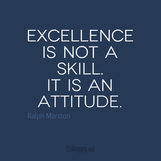 I receive an email every morning from the nationally acclaimed author, entrepreneur, marketer, and public speaker, Seth Godin. His blog posts are designed for people who are building and marketing businesses , but they are appropriate for nearly any situation you may find yourself in. His ideas, thoughts, and presentation are pure genius. Along with several others this week, today's post was in essence about mediocrity, and it got me thinking about our culture and the fact that “okay” or “fair” are completely acceptable and actually expected from the masses. The good news about this particular inspiration is I get to trot out the anthro geek. To be honest, I have been missing her lately. To get to the heart of the mediocrity issue, we need to first define a few terms. Culture in its most basic form is a set of learned beliefs, knowledge, and activities of any society. Culture is something passed on from one generation to the next through explicit teaching, but also through the subtle messages of propaganda. Culture can be very broad or very narrow, because within a society there are regions, communities, and individual families. For example: Culture in the United States is expansive, and not everyone learns the same exact behaviors, but family culture is exclusive to the familial connections. Ethnocentrism is the belief by one culture that everything within their culture is superior to any other. This concept originated as Eurocentrism as Europeans came into contact with other groups of people around the world and proceeded to convince those other people that they were primitive, backward, unsophisticated, barbaric, and savage. All things European were considered superior because. After all. Europeans had great societies, large monuments, big cities, art, written language, music, sophisticated religion ; you get the idea. Of course they failed to recognize that the people they were labeling had all of that; it just looked different than what they were used to. We can all recognize how dangerous ethnocentrism can be. It gives us the excuse to create the “other.” You know, those people over there who don't quite fit into our cultural world-view (remember this can be a broad or narrow interpretation). And once we are in that mindset, we are further excused if we treat “them” differently or hurt them in any way. “They” aren't like us, so it is OK. On one side of the spectrum we find judgment and discrimination, and on the other we find genocide and other unmentionable acts of torture. This becomes an insidious problem because we all want to fit into that societal mold. Each of us changes our expectations, motivations, and even thoughts so we too can squeeze into the narrow confines that define our culture, because none of us wants to be classified as different or “the other.”. Which leads us to being an individual within a culture that not only accepts mediocrity from the greater society, but from ourselves as well. This is a topic Seth Godin touches on frequently in his daily posts: When we take ourselves “off the hook” and intentionally cut corners and create products, ideas, relationships, or services that are mediocre or just okay, we are failing our society and ourselves. And we are defeating our kids and their kids, and well you get the idea! Mundanity becomes part of our culture and whizzo-whammo is passed onto future generations because culture is. . . How can we change this perpetual track of indifference? When do we get tired enough of crappy stuff to offer a solution? I would like to think the time for a change in perspective has come. I believe that if we all accept and take responsibility by committing ourselves to creating quality, and if we all stand up with courage to say mediocrity is not okay and express our expectations for excellence from companies, government, organizations, and individuals, then we can change the culture one interaction at a time.
1 Comment
|
|
© 2024 Whole Learners, Inc. 501(c)3
Deep Root Center
48 Riverside Drive, Canton, NY 13617
315*323*1435/[email protected]
Deep Root Center
48 Riverside Drive, Canton, NY 13617
315*323*1435/[email protected]



